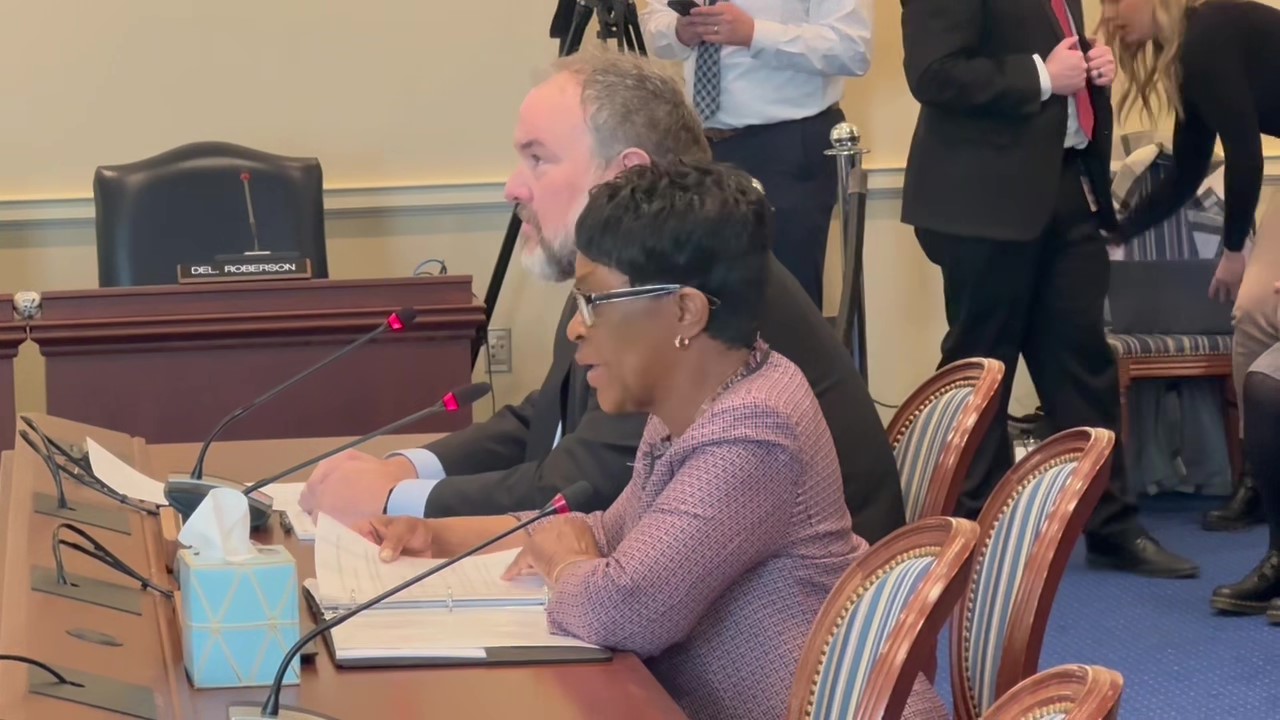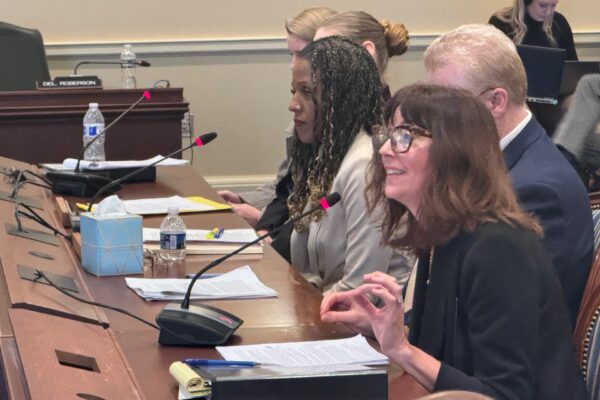Speaker Jones: ‘We aren’t going to deny children their constitutional rights’

As Maryland lawmakers take on criticism for a proposed juvenile justice reform bill, House Speaker Adrienne A. Jones (D-Baltimore County) testified Thursday in its support.
Jones, who rarely appears at bill hearings, spoke first before a packed Judiciary Committee room on House Bill 814 – Juvenile Law Reform. She expressed some frustration at how the legislation has been characterized by critics.
“I brought this bill forward because our juvenile system is clearly failing a small set of children who are repeat offenders. They are not monsters or teen villains,” she said. “They’re children and they are increasingly calling out for our help because they are not getting the services they need.”
Jones continued: “I know this bill is going to disappoint both sides of the debate, and I’m comfortable with that reality. What I’m not comfortable with is the way the debate around this bill…has been framed. In fact, I’m incredibly disappointed. We aren’t going to deny children their constitutional rights.”
Jones’ presence at Thursday’s marathon hearing represents lawmakers’ willingness to tweak the current juvenile justice system to combine rehabilitation with accountability. While she possesses plenty of political clout within the General Assembly, the question is how much weight she carries with the general public, many of whom call crime their top worry and are seeking tougher penalties for juvenile offenders.
The speaker has said the legislature won’t roll back juvenile justice reform measures that the legislature passed in 2022, but instead would work this year to improve the overall system.
The state Department of Juvenile Services (DJS), which oversees programs for troubled youth, has been criticized by some state’s attorneys, law enforcement officials and residents for not doing enough to help those young people and their families.
Del. Luke Clippinger (D-Baltimore City), chair of the Judiciary Committee, which reviewed the legislation for slightly more than five hours Thursday, said the proposed juvenile bill would require a review of data relating to arrests, completion of programs and recidivism from the Maryland Longitudinal Data System Center.
The legislation would also require the Commission on Juvenile Justice Reform and Emerging and Best Practices to complete several tasks such as reviewing the department’s education and diversionary programs, researching evidence-based programs and reviewing fatalities that involve children under the supervision of DJS. That commission was established by the 2022 legislation but hasn’t been fully seated.
The bill would more than double the number of members on the commission to include representatives with the state Department of Health, a private child welfare agency, the state Department of Education and Department of State Police.
“I believe this is sorely needed,” Clippinger said about the commission.
Alice Wilkerson, executive director of Advance Maryland, a nonprofit organization that assists other groups with advocacy efforts, praised the bill for including a commission.
But that’s where the compliments on the bill ended.
Wilkerson, who appeared on behalf of the Maryland Youth Justice Coalition, joined at least two dozen criminal justice advocates, lawyers and residents who testified against the legislation. A committee’s speaker list showed a total of 80 people who offered written or oral testimony opposing the measure.
“This bill will exacerbate racial disparities,” Wilkerson told the committee. “How will this improve safety? Will this lead to positive behavioral change? This legislation will grow the juvenile justice system, placing further personnel and budget strain on DJS that will lead to more cuts to services and programs.”
‘Fear, rather than evidence’
Maryland Public Defender Natasha Dartigue led those who opposed the bill who raised one central question: Where’s the data?
They were criticizing a part of the bill that would allow the Department of Juvenile Services to send to juvenile court children as young as 10 who have been arrested for serious offenses, including those involving a firearm, motor vehicle theft, animal abuse, or a third-degree sexual offense.

Alycia Capozello, deputy district public defender in Baltimore, speaks against juvenile justice legislation before the House Judiciary Committee on Feb. 8, 2024. Maryland Public Defender Natasha Dartigue, center, listens. Photo by William J. Ford.
According to the Department of Juvenile Services, complaints for youth under age 13 decreased by nearly 1,100 in fiscal year 2022 to 301 last fiscal year. Those complaints include crimes of violence, misdemeanors and Children in Need of Supervision referrals, which involve youths who need guidance, treatment, or rehabilitation.
“Proponents of the bill have alluded that the intent is to improve public safety. The impact of the bill is that it will incarcerate more Black children from marginalized communities throughout the state,” Dartigue said. “We must base our discussions on facts, data and the evidence-based information. Despite the intent of public safety, House Bill 814 raises concerns about the perpetuation of systemic biases and the potential for decisions based on fear, rather than evidence.”
Montgomery County State’s Attorney John McCarthy (D), who spoke in support of the legislation, cited some figures from the county’s police department.
Larceny arrests of juveniles decreased from 387 in 2019 to 128 last year; arrests for disorderly conduct went down from 32 in 2019 to five last year.
McCarthy said the numbers of more serious crimes by juveniles in his jurisdiction increased, such as shootings from 16 in 2019 to 40 last year, and auto thefts from 44 to 364. He also discussed those figures at a Jan. 17 briefing before the Senate Judicial Proceedings Committee.
“There have been declines in crime, but when it comes to violent crime and the crime that people care about, the numbers are exploding,” McCarthy said.
Some of the same people who testified Thursday may return to Annapolis on Friday because the Senate version legislation will be discussed before the Judicial Proceedings Committee.




 Creative Commons Attribution
Creative Commons Attribution